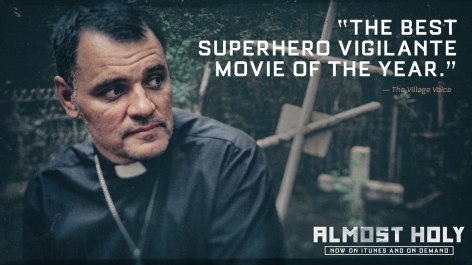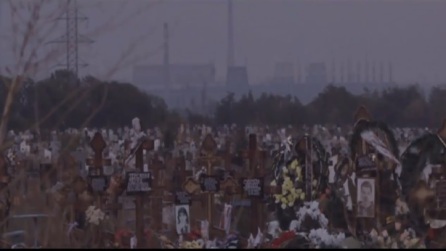In my last post I entered the general information about the movie Almost Holy by Steve Hoover about Gennadiy Mokhnenko, the pastor “Church of Good Changes” who fights against miseries of people who had to live in the streets of Mariupol or non-human living conditions and fell into bottomless pit of alcohol, drugs and underground life which would not offer any positive perspective for them as well as would not improve the face of the reputation of the country.
I mentioned that I consider this movie to be not a ‘nonfictional’ documentary because it has some clearly observed ‘fictional’ symbols (which is not a negative statement, it is great! think outside the box!) such as the parallel with the character from the USSR cartoon, washing his hands and swimming in the cold sea.
The most central and obvious symbol is the fact that the pastor calls himself Pastor Crocodile several times throughout the film, because he compares himself to the Crocodile Gena from the famous USSR children’s cartoon Cheburashka created by Eduard Uspenskiy and Roman Kachanov. Obviously the animal characters are an allegory to the real human characters. Crocodile Gena is a male stranger in the city, thus he is represented as dangerous predator. This technique gradually invites the viewer to change the prejudiced attitude towards someone one does not know. He appears to be “kind [and] [he cares] about children”. He is looking for friends and Cheburashka, the nameless homeless toy, which nobody wants to take (parallel with children from the Piligrime), becomes his best friend. “Do you know how many of such lonely people live in our city? We need to make them friends!” Together they fight against the evil deeds of the old woman Shapoklyak.
Also crocodile as an animal represents a predator or a hunter side of Gennadiy’s character but with a purpose not to harm but to hunt drug dealers, eliminate danger of street life. At some point of the film Gennadiy tells the viewer that pharmacies illegally sell ingredients for the real drugs. “Cheap and dangerous”, Gennadiy shows some pills just bought illegally in one the drug stores. “They produce Krokodil drug from it. So sad but it’s Ukraine.”
Another symbol is when Gennadiy washes his hands after some twisted cases which are difficult to realize in its full seriousness, like in the case of death-mute woman, who was abused for years by her self-appointed ‘husband’. He does not reject the responsibility and consequences of such situations and he still deals with them, however his human side, which is trying victim’s shoes cannot handle it and instinctively aspires to escape.
Another symbol could be seen in Gennadiy swimming in the cold winter sea of Mariupol. He says that it is tiring to be there in summer surrounded by many people, but it is appreciated when he gets the opportunity to be able to be face-to-face with himself at the empty beach side, to be able to deal with the own troubles, because every human being has such. We often hear the jokes that psychiatrists need their own psychiatrist, which has part of the truth. People usually have a mistaken attitude that if one is priest or pastor in church he must be holy and cannot have own sinful fall moments. “This highly stylised documentary […] clearly wants viewers to accept him as a saint of sorts, hence the title, and there’s no doubt the shelter he offers victims is preferable to the atrocities they face beyond Pilgrim’s walls. But a telling scene where he gets worked up about the “criticism” of him on his Wikipedia page hints at a darker side to his character, and he doesn’t take kindly to a journalist querying his vigilante methods.”, writes Leslie Felperin. He is a human like anyone else, who needs to talk or to box to take out the rage.
After Almost Holy was released Gennadiy received the status of an antihero or a vigilante.  He though sees himself as Robin Hood: “The sword should be owned by the government. If this is not happening and the society sits silently and silently buries its sons, then Robin Hood rises.”
He though sees himself as Robin Hood: “The sword should be owned by the government. If this is not happening and the society sits silently and silently buries its sons, then Robin Hood rises.”
“Who has given you right [to act so]?” – no one has given him right, because he believes that he does not need a documented paper to do good deeds. “I hope that my life will leave a mark and this place will become a little bit better, thus my country will become better.” It is logically that this question appears, because nowadays more and more the questions of freedom of actions and speech rise promoting personal freedom almost in everything; thus does Gennadiy have right to forcibly change someone’s life? In fact, he gives a choice for adults, showing them the different and possible side of their existence, but he does not want ill-parents to force their children into drugs or alcoholism only because they have chosen that way.
“While he is respected for his aggressive campaigns to rescue homeless youth, Gennadiy is not without critics. There are some who question his morals and forceful methods.” It is true that he is being quite harsh with the way he deals with people whom he is trying to help, but here one should consider cultural and peculiar properties of specifically characterised society of underground. People there usually do not appreciate or respect politeness because this is how they were brought up and they do not know the other way. Obviously, gradually attitude should change, but in general sophisticated and high spirit vocabulary will not deliver correct message to their limited minds. Sometimes Gennagiy has to behave like a chav because this is the only way his persona would not fall in the eyes of those children and he would be perceived as an authority to be able to deal with issues.
 There is the scene where one sees horrible shots of the boy from Piligrim who got drugged once more: “Why should I buy your medicine? Convince me… Why use money on you instead of buying shoes or ice cream for the good kids? […] Or should I blow a fortune on your unlikely recovery? So you can spike their veins underground?”
There is the scene where one sees horrible shots of the boy from Piligrim who got drugged once more: “Why should I buy your medicine? Convince me… Why use money on you instead of buying shoes or ice cream for the good kids? […] Or should I blow a fortune on your unlikely recovery? So you can spike their veins underground?”
“Do you understand that this self-appointed judgment can end not very well?” – Gennadiy is asked on one of the interviews, “Yes, but God makes my fist firmer”. Therefore his respond to the boy was that “if [he] was God – [he] would not give [him] the recovery”. His judgment is harsh but reasonable, although it has to be so when your “day-to-day is spent wrestling with issues of sexual assault, domestic abuse, homelessness, addiction, and illness.”
Ironically, as the representative of church, Gennadiy originating from the light has to fight in the darkest corners of society. Gennadiy says one of his favorite books is The Brothers Karamazov by Fyodor Dostoyevsky: “Russian classics for me was the best influence in my life. This built my soul, understanding, this built my world, my life. […] You feel like Dostoyevskiy [takes] questions from you.” He opens the page from the book and reads the underlined phrase explaining his perspective on how and why he chooses his actions: “я против бога не бунтую, я только мира его не принимаю” – “I’m not rebellious against God, I just do not accept his world” (the translation is mine, hence there is the original provided as well for those who can read in Russian and directly understand the exact meaning). “Dostoyevskiy says that [his] fault is in all the tears of the world, in all the world’s tragedies. My fault is in every evil around. It’s not God’s problem, [it is] my problem.”
Gennadiy also believes that there are faults in many of fathers who did not know how to be men. There is the scene where Gennadiy opens the eyes of the boy, he sees his parents and he immediately scream Papa! and runs to hug the man. “Now he has two papas”, laughs Gennadiy. His father was junky and boozer, hence he looks really bad and his legs are in horrible state. He does not have any concrete plans for the future which is why pastor asks him to “do so that [he] would not have to deliver the news about [his] death to [his] son”. Some kinds become alcoholics and homeless from 4 years old because of such domestic education. Furthermore, death-mute people are not properly understood in the society, because people are unaware and illiterate in this sense. In the novels of Dostoyevskiy the theme of fatherhood appears to be a prominent one as well, in The Brothers Karamazov particularly the father is too self-centered on his personal life, paying minimum attention to his sons, who were sent away to the seminary to study by their own father to not get in the way.
Gennadiy is aware that his deeds are just a micro part of the world events,  and he is aware that one day he will die as well. He thinks “O my God, we are only in the one spot in the universe, which one cannot even see from the space ship. It would be blessing to end up in the grave. Everything turns into some kind of madness of the universal order. What is gonna be after?”
and he is aware that one day he will die as well. He thinks “O my God, we are only in the one spot in the universe, which one cannot even see from the space ship. It would be blessing to end up in the grave. Everything turns into some kind of madness of the universal order. What is gonna be after?”

Reblogged this on VIRTUAL BORSCHT .
LikeLike